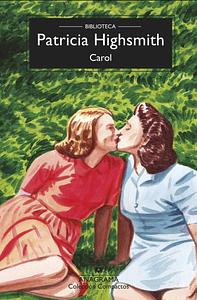Take a photo of a barcode or cover
Stunning. No, that isn't quite right. It was like a tide, both slow and strong that drew you in and subtly under. I kept thinking, "they [Therese and Carol] seem to not know each other very well, and to be very opposite" until the moment that they did and I couldn't picture them ever settling for being apart.
Reading the Afterward was very moving. Ms. Highsmith wrote of all the young men and women who, shyly yet fervently, wrote her letters to thank her for writing a true love same sex love story that didn't end tragically.
God, books are so important.
Reading the Afterward was very moving. Ms. Highsmith wrote of all the young men and women who, shyly yet fervently, wrote her letters to thank her for writing a true love same sex love story that didn't end tragically.
God, books are so important.
Loved this book from start to finish. There's an extraordinary sense of time and place, and Highsmith created a very real-seeming person in Therese. I'm having hard time articulating it, but Therese seems to be sure of herself and her life choices, then unsure again, in precisely the way I remember feeling when I was her age--and a bit older. The way she works through different possible versions of her life, trying to hedge her bets at times even when she feels the inevitability of one path, just feels so authentic to what a 20-year-old would do.
I really liked the ending. The only thing I wondered about was Highsmith's intention in including the gun in the story. I thought it might figure in to the end somehow and when it didn't, I was surprised. Especially given Therese's nominal career as a set designer, I thought immediately of Chekhov's gun, but maybe Highsmith misleads purposefully? One thought: Perhaps she is using the gun symbolically to show that what some might deem dangerous--e.g., a lesbian relationship in the 1950s--is not really dangerous at all, except for those in the relationship who leave themselves open to heartbreak.
I'll be thinking about this book for a while, I expect.
I really liked the ending. The only thing I wondered about was Highsmith's intention in including the gun in the story. I thought it might figure in to the end somehow and when it didn't, I was surprised. Especially given Therese's nominal career as a set designer, I thought immediately of Chekhov's gun, but maybe Highsmith misleads purposefully? One thought: Perhaps she is using the gun symbolically to show that what some might deem dangerous--e.g., a lesbian relationship in the 1950s--is not really dangerous at all, except for those in the relationship who leave themselves open to heartbreak.
I'll be thinking about this book for a while, I expect.
I really enjoyed this one, especially after coming off of a "Kin of Ata" letdown.
Highsmith is so good at describing people and inner thoughts and emotions that the reader really connects with the characters and their motivations. Even if we don't always understand or agree with a character's actions, we understand their motivation.
Although this is listed in some circles as "romance" or "pulp", I found it to be more of a coming of age story where the young woman, Therese, really discovers who she is and what she wants from life. Actually, for both women, because Carol also comes to truly understand who she is and what she is willing to risk for love.
Although it is ultimately a love story, I didn't find it sappy or filled with flowery romance. It was sweet and engaging and held my interest all the way through. Bechdel Test Pass with flying rainbow colors!
Highsmith is so good at describing people and inner thoughts and emotions that the reader really connects with the characters and their motivations. Even if we don't always understand or agree with a character's actions, we understand their motivation.
Although this is listed in some circles as "romance" or "pulp", I found it to be more of a coming of age story where the young woman, Therese, really discovers who she is and what she wants from life. Actually, for both women, because Carol also comes to truly understand who she is and what she is willing to risk for love.
Although it is ultimately a love story, I didn't find it sappy or filled with flowery romance. It was sweet and engaging and held my interest all the way through. Bechdel Test Pass with flying rainbow colors!
Lovely prose but somehow breathtakingly dull. Supposedly these two women are fascinated by one another but I can't imagine why. I'm hard-pressed to think of two more boring literary characters. I found this book an utter chore.
I read this book slowly, maybe because I saw (and loved) the movie and knew what was going to happen. I also loved rolling around in the clean, deep prose (oh, mid-century literature!) and period details, relishing a time before anything was made of plastic, feeling grateful for the time after Stonewall. I went in knowing I would encounter queers who stand up for themselves and a mother who dares to be something other than a mother. What also bloomed unexpectedly was a story about growing up. Therese doesn't just discover that she loves women. She discovers what it means to love a real person in the real world. If society's judgement is the price she pays for salt, an adult relationship is a meal cooked in a well-seasoned pan. As Carol says when they are discussing caviar, "Acquired tastes are always more pleasant--and hard to get rid of."
“Do people always fall in love with things they can’t have?”
“Always”
“Always”
reflective
slow-paced
Plot or Character Driven:
Character
I love that so many early queer novels are getting a revival of sorts. The Price of Salt, or Carol, has lived rent-free in my mind since I finished it.
Therese is one of my favourite protagonists and I was completely immersed in her world. I have read quite a few reviews where readers rate the book down because they find Therese and Carol unlikeable. They can be, but I absolutely love how flawed they are. The characters drive this novel - without them, it is quite slow paced and lulls in a few places. And while this book had my attention from start to finish, it didn't feel too special in its literary qualities (it was certainly a remarkable book for its historical merit and everyone should read it for that alone).
But then I got to the ending and everything came together in the most satisfying way. Highsmith was one of the writers who began to change the narrative in how homosexuality was portrayed in literature. So many tragic endings, so much heartbreak, last minute heterosexuality, etc. Highsmith and Renault bucking the trend, no longer just satisfied with the sympathetic portrayal of homosexuality, but daring enough to write a hopeful ending.
4.5 stars, very glad to see its getting a reprint with Dover (the kite scene is probably the one that stands out most vividly from reading this the first time). And thank you to NetGalley and Dover for the ARC!
Therese is one of my favourite protagonists and I was completely immersed in her world. I have read quite a few reviews where readers rate the book down because they find Therese and Carol unlikeable. They can be, but I absolutely love how flawed they are. The characters drive this novel - without them, it is quite slow paced and lulls in a few places. And while this book had my attention from start to finish, it didn't feel too special in its literary qualities (it was certainly a remarkable book for its historical merit and everyone should read it for that alone).
But then I got to the ending and everything came together in the most satisfying way. Highsmith was one of the writers who began to change the narrative in how homosexuality was portrayed in literature. So many tragic endings, so much heartbreak, last minute heterosexuality, etc. Highsmith and Renault bucking the trend, no longer just satisfied with the sympathetic portrayal of homosexuality, but daring enough to write a hopeful ending.
4.5 stars, very glad to see its getting a reprint with Dover (the kite scene is probably the one that stands out most vividly from reading this the first time). And thank you to NetGalley and Dover for the ARC!
emotional
hopeful
inspiring
sad
medium-paced
Plot or Character Driven:
Plot
Strong character development:
Complicated
Loveable characters:
Complicated
Diverse cast of characters:
Yes
Flaws of characters a main focus:
Yes
for some reason (probably something i can't mention here) i was into the first half enough to continue it despite being aware of the age difference, but as i finished that off and tried to move forward...it lost whatever its appeal was to me. i don't know. i'll see if i'd be in the mood to finish it tomorrow but i really don't think i will. i might rewatch the movie, though!
challenging
dark
emotional
slow-paced
Plot or Character Driven:
Character
Strong character development:
Yes
Loveable characters:
No
Diverse cast of characters:
Yes
Flaws of characters a main focus:
Yes






